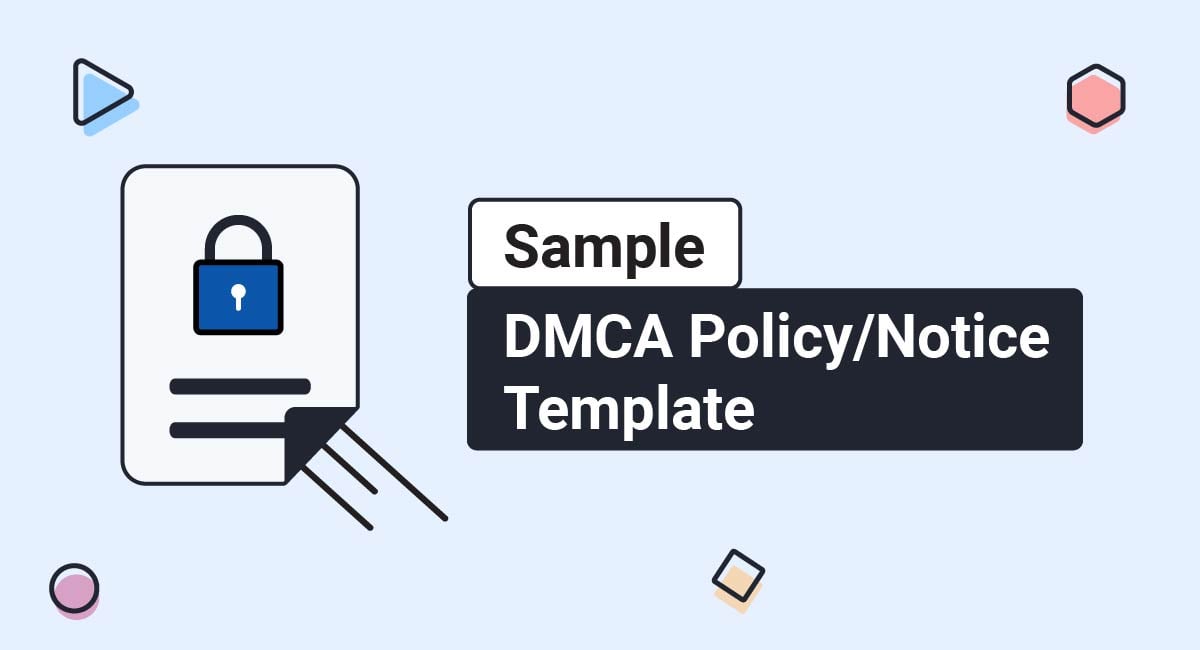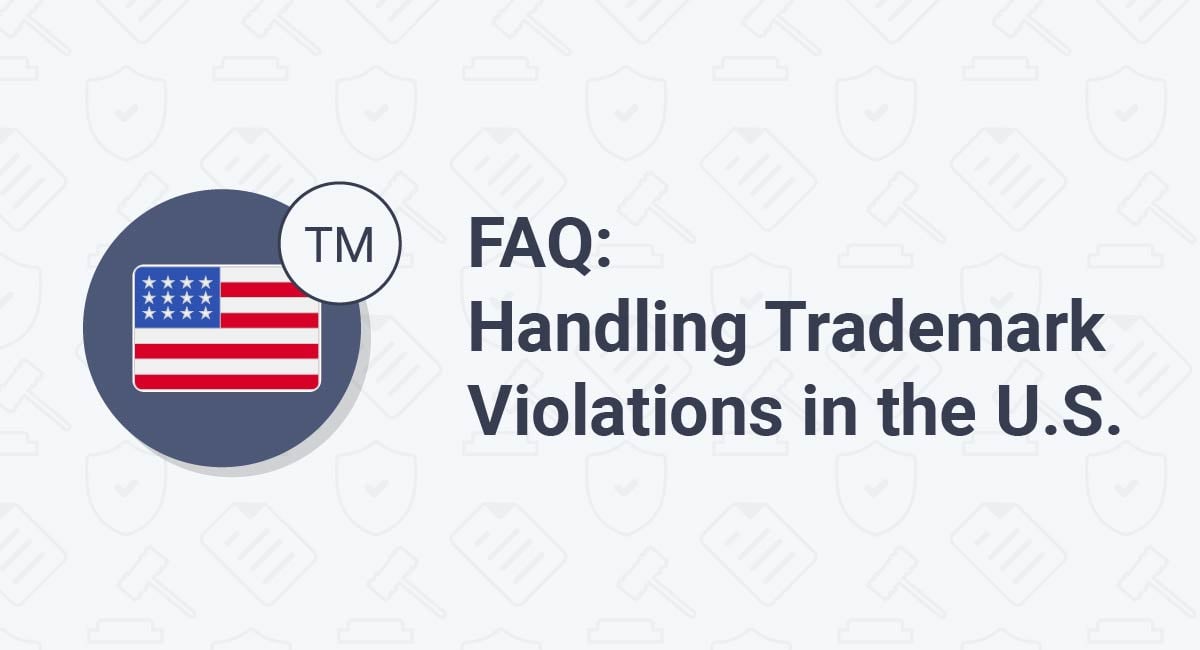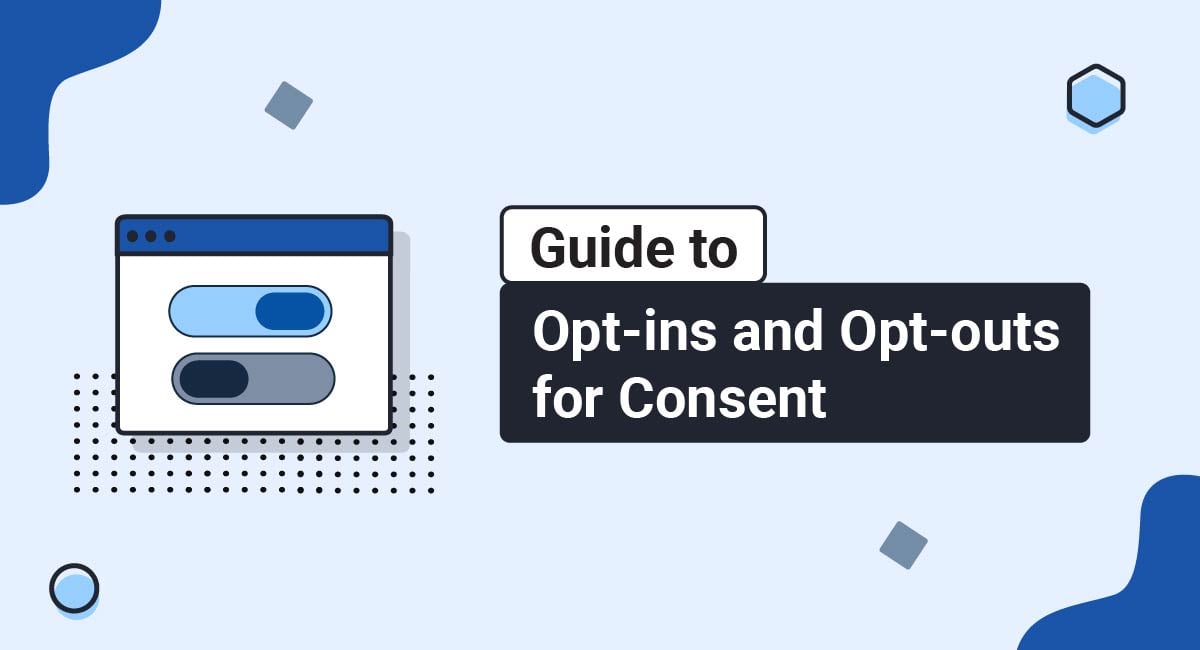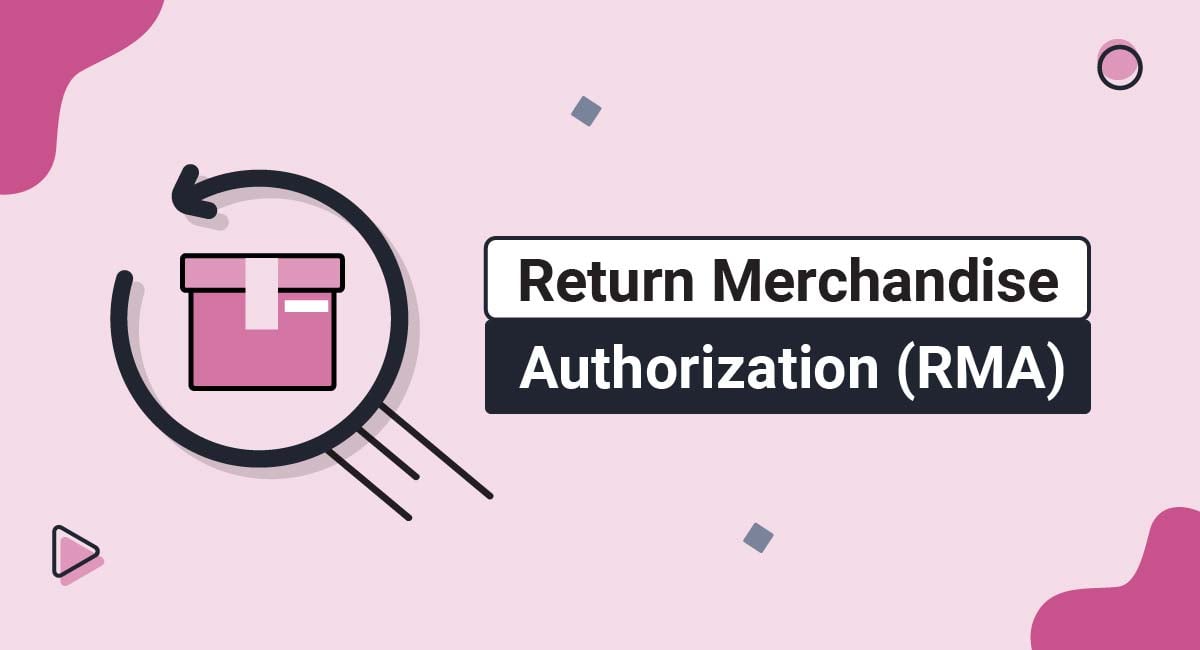A DMCA Notice notifies a website that there is copyrighted content being used without permission on that site.
A DMCA Policy is a set of rules for how to submit a DMCA Notice for the website and how those notices are processed.
Both are very important for any website that allows users to generate and upload their own content so that the website can be protected from any potential infringement of copyrights.
It's important that your policy not only go over the generalities of how you process DMCA Notices but also specific instructions for how to submit a notice and how to submit a DMCA Counter Notice. Policies missing these instructions are incomplete, and that could cause some headaches for you in the future if there is a case of possible copyright infringement on your website.
This article will explain what a DMCA Notice and DMCA Policy are in more detail, and help you create your own.
- 1. About the Digital Millennium Copyright Act
- 2. Requirements of the Digital Millennium Copyright Act
- 3. What is a DMCA Policy/Notice?
- 4. Who Needs a DMCA Policy?
- 5. How Do You Create a DMCA Policy?
- 5.1. Introduction and Explanation
- 5.2. Instructions for Submitting a DMCA Notice
- 5.3. DMCA Counter Notice Instructions
- 5.4. Repeat Infringement Policy
- 6. Where Should You Publish Your DMCA Policy?
- 7. Summary
About the Digital Millennium Copyright Act
The Digital Millennium Copyright Act, or DMCA, is a law protecting service providers from responsibility if copyrighted content is uploaded through their service. For example, if a user uploads a copyrighted song onto your website, the DMCA protects you from liability, as long as your site meets certain conditions in your DMCA Policy.
Copyright owners want to make sure that they can control the distribution of their digital property. That means that if someone illegally distributes their works, they can prevent it from being distributed.
The DMCA is only applicable for U.S. businesses. For non-U.S. businesses, this kind of clause is usually called a Copyright Infringement clause instead.
Requirements of the Digital Millennium Copyright Act

You're required by the DMCA to respond to takedown notices and remove any content that users on created and posted on your website or app that they do not own the rights to.
Your platform or online service (which can be a website, a mobile app, a software app, and so on) can allow for user-generated content to be published and made available to the other users, either other registered users or not.
Users need to own the rights to any kind of content they share through your platform. Otherwise, it may constitute infringement of the actual owner's rights.
If the content users post through your website is copyright infringement and you receive a takedown notice from the copyright owner, you're required to respond to the takedown if it meets DMCA requirements.
In order for a DMCA Takedown Notice to be sent to you by an author (owner of copyright content) who may have found infringing content on your platform, the notification should meet the following requirements and include the following information:
- Have an electronic or physical signature of the copyrighted work owner (or authorized person)
- Include a description of the copyrighted work, including the URL where this infringing content is available or a copy of it
- Include the contact details of the person submitting the notice: An email address, telephone and address
- A statement in "good faith belief" that the work is not authorized by the copyright owner
- A statement by the person who sends the takedown notice that the information included in the notice (all the above information) is accurate and that the person sending the notice is either the copyright owner or authorized to act on the copyright owner's behalf
Note that there are a number of exceptions to the DMCA. These exempt certain activites related to nonprofit libraries, educational institutions, archiving activites, investigations, protective and security activity and government activity.
You can read Copyright Law - 17 U.S.C 512(c)(3) for more information.
What is a DMCA Policy/Notice?

A DMCA Policy should clearly outline how the copyright owner can claim their copyright was infringed, and how the user who potentially infringed on the copyright can counterclaim that their use was legitimate.
Part of the above process involves a DMCA Notice. A DMCA Notice is a message the copyright holder sends the website owner or administrator to notify you that their copyright may have been infringed.
The message will request that the copyrighted content be taken down from the site. It also has to meet a few more requirements, like identifying the specific copyrighted work and the name and contact information for the person giving the notice.
You can include a DMCA clause n your Terms and Conditions agreement (also known as Terms of Use or Terms of Service.)
A DMCA Notice would inform authors that any infringing content they have found on your platform can be taken down if it meets the requirements explained in your agreement.
Here's how eBay includes this information in a short clause in its User Agreement. Note that it links to a separate page, which is a great way to get more detailed information out while keeping your Terms agreement shorter and easier to digest:
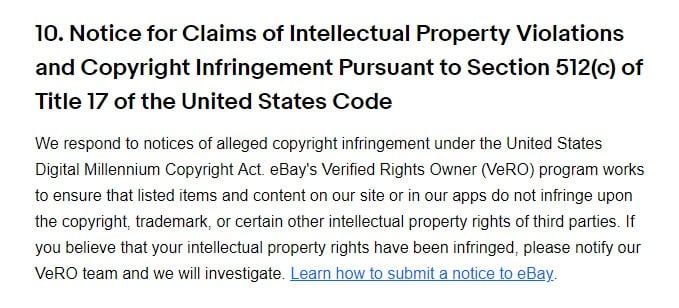
As eBay does, you can include the "DMCA Notice" clause for informing copyright owners as a separate page, titled DMCA or Copyright, that only deals with copyright-related guidelines and rules.
Who Needs a DMCA Policy?

Your website needs a DMCA Policy if people could potentially upload copyrighted content to the site.
If you or your company are the only entities uploading content to your site, you don't need a DMCA Policy. There isn't any possibility that a user could upload something that's copyrighted. But if there is, a DMCA Policy is a great step in making sure you're on the right side of any potential copyright conflicts.
Social media websites, websites that publish user-generated videos or essays, and forums are all examples of websites that need DMCA Policies. If you aren't sure whether your website should have one, you may want to have one anyway. It certainly won't hurt you to have one, and it can potentially save you some major headaches if it ever does become relevant.
However, if you run a personal website or a news site that publishes curated content from authors you employ, you don't need a DMCA Policy. In those cases, anyone who might upload copyrighted content would be doing so as a part of the service provider, and their actions wouldn't be covered under the DMCA.
How Do You Create a DMCA Policy?

A DMCA Policy is an important part of many websites, but you should make sure yours has everything it needs to.
There are four essential pieces to any complete DMCA Policy:
- Introductory paragraph and explanation
- Takedown notice instructions
- Counter notice instructions
- Policy on repeat infringement
Although not all DMCA Policies include every part listed above, you should consider including all of them in your own. A more complete policy will help prevent issues while providing clarity if there's ever a dispute about your process. It can also provide important information for people who want to protect their copyrighted works but need your help doing it.
These are the main components you should include in your DMCA Policy.
Heroku has a separate DMCA Notices page with all the necessary information needed in order for someone to send in a compliant. It includes a list of exactly what information must be provided, how it must be provided (in writing), and includes the mailing address and other contact methods for the company:
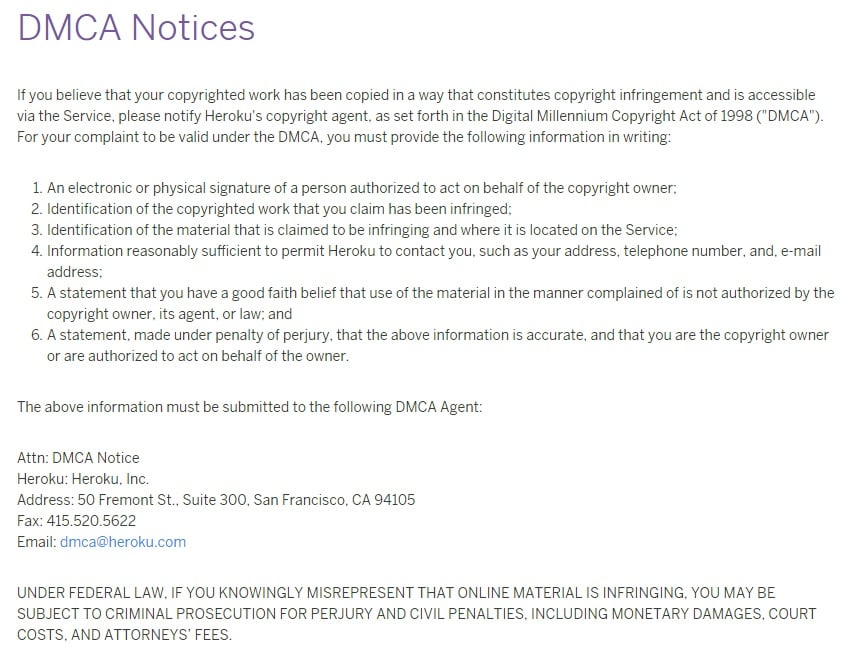
Introduction and Explanation
Your DMCA Policy needs to start with an introduction explaining what the DMCA is and an overview of the process for submitting a DMCA Notice.
It should cite the name of the relevant law and provide a link to the text of the law, and then go through the actions that copyright holders can take if they suspect someone has violated their copyright.
It should then mention some of the potential outcomes from a DMCA Notice.
Citing and linking to the relevant law helps others understand why your process is set up the way it is. It means that if there's ever a dispute about your process, you can show that anyone who used your process had access to the law. It also establishes your own knowledge of the law and willingness to put it to work for yourself.
Your brief overview of the DMCA Notice process should help readers understand what's expected from them and what they can expect from you. You might specifically mention that one potential outcome is that you take down the copyrighted content from your website. Often, that's what copyright holders are looking for.
You should also include that the final decision on whether to take action and what action to take is up to you.
The introduction to Dropbox's DMCA Policy checks all of these boxes nicely:

It names and links to the relevant law, outlines the process for submitting a DMCA Notice, and lets the reader know that Dropbox may take down content that violates a copyright.
Instructions for Submitting a DMCA Notice
Perhaps the most important part of your DMCA Policy is a set of clear instructions on how copyright holders can submit a DMCA Notice.
These instructions should include contact information for your company's copyright agent, including multiple ways to contact them, and a list of all the information that submitters need to include in their DMCA Notice.
If you run a website yourself or without many staff members, you might not have a designated copyright agent yet. That's normal, but it might be a good idea to create a new inbox for "DMCA@[yourwebsite]" or something similar if you expect a large volume of DMCA Notices.
You may want to include both a website and a physical address, in case submitters want to mail you physical materials as well. You also may want to consider registering a copyright agent with the U.S. copyright office.
Another option is to create a form where copyright holders can submit their notices. That way, you can make sure everyone submits the correct information and that the form gets sent where it needs to go. You should remember that not everyone prefers filling out forms, so if you do create one it should be in addition to, not instead of the manual process.
Here's an example of a webform provided by Dropbox that makes it very easy and understandable for anyone who wants to submit a notification of claimed infringement:
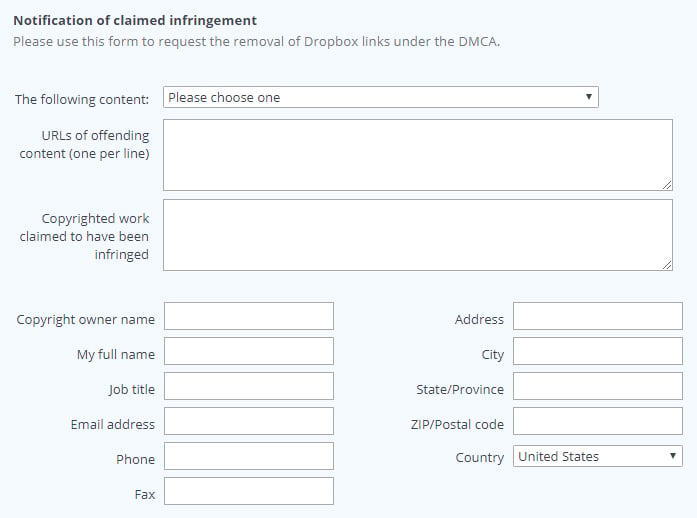
Dropbox also provides clear instructions for submitting the same information:
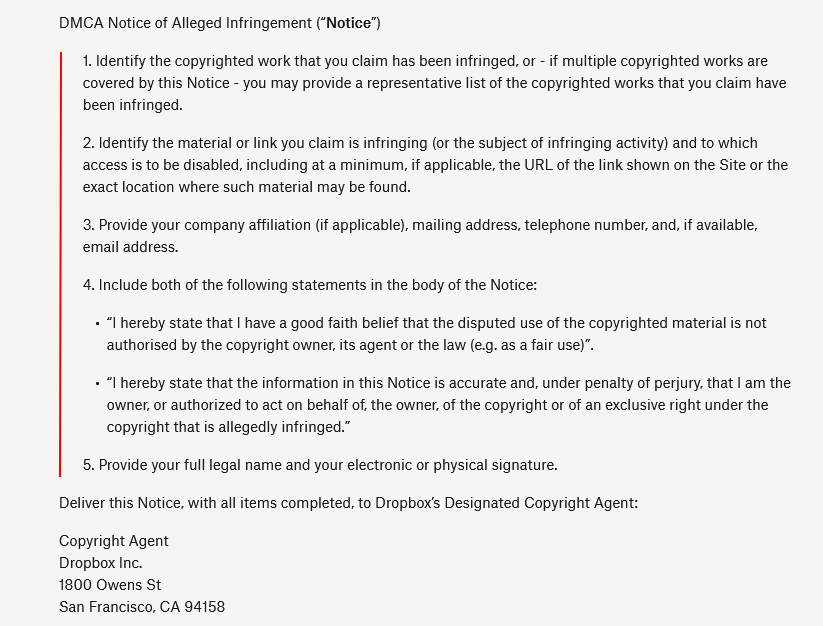
The instructions themselves are the most important part of this step. You should instruct people submitting DMCA Notices to include key pieces of information, such as the following:
- Name, address, phone number, email, title, other contact information
- The name, description, and other identifying information about the relevant copyrighted work, including URL or physical location if applicable
- The same information about the material violating that copyright
- A statement on the submitter's belief that the copyright is being used without permission and against the law
- A statement that the information given is accurate and that the submitter is authorized to submit a DMCA Notice for this copyrighted work
Then just instruct submitters to send the above information to the copyright agent, and the most important part of your DMCA Policy is complete.
Reddit follows each of these steps in the DMCA section of its user agreement, as shown below:
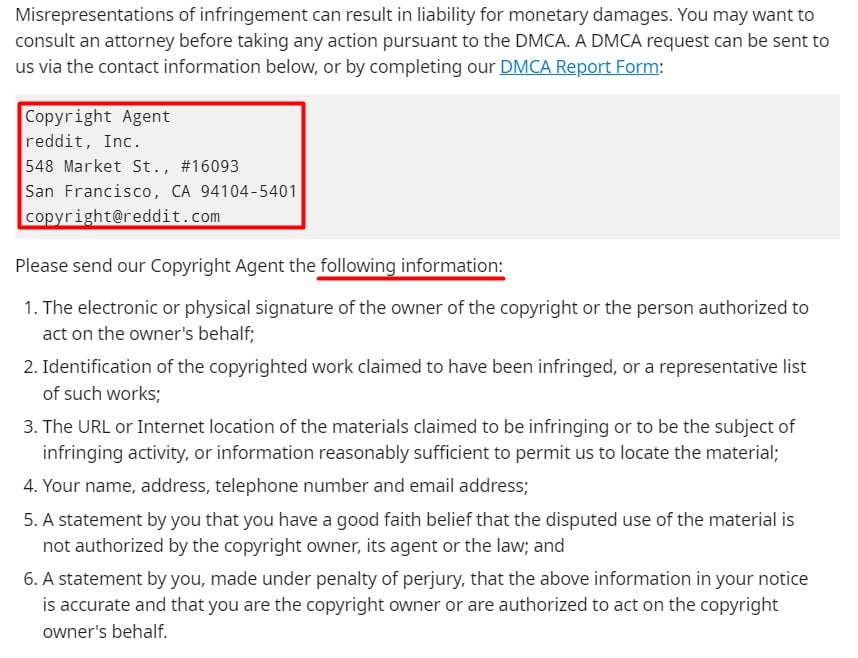
DMCA Counter Notice Instructions
A DMCA Counter Notice is similar to a Notice, with just a couple of key differences. Because they're so similar, the instructions you give for each of them should be similar as well. As with the DMCA Notice instructions, you should include a brief introduction with an overview of basic information and then get into the actual process for submitting a counter notice.
The introduction to the counter notice instructions should be similar, but not identical to how you began the DMCA Notice instructions. The main difference should be some explanation of the kinds of circumstances that can justify a DMCA Counter Notice and, if applicable, the timeline for submitting a counter notice.
When it comes to what information submitters should include, it should be pretty much the same as what you needed for the DMCA Notice. A key difference is that you should make sure the submitter consents to jurisdiction in a given location and that they consent to service of process from the original submitter of the DMCA Notice.
GitLab has a good, clear DMCA Counter Notice requirements policy:
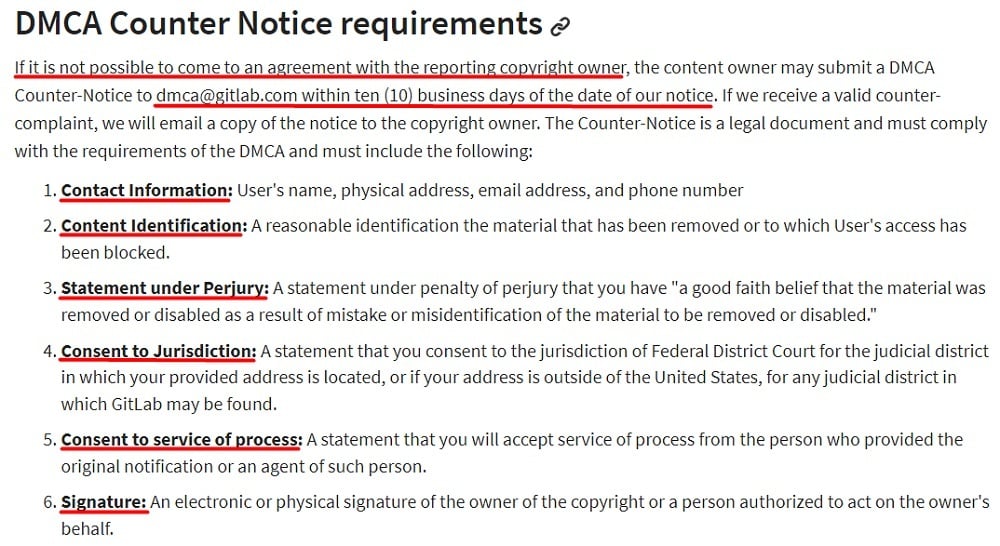
You can see it specifies that submitters should only create a DMCA Counter Notice if they cannot resolve the issue with the owner of the copyright. It also gives a 10-day timeline for submitting the DMCA Counter Notice and gives an easily understandable list of requirements for that notice.
Here's how 500px does this with instructions on how to "restore content removed from the website:"
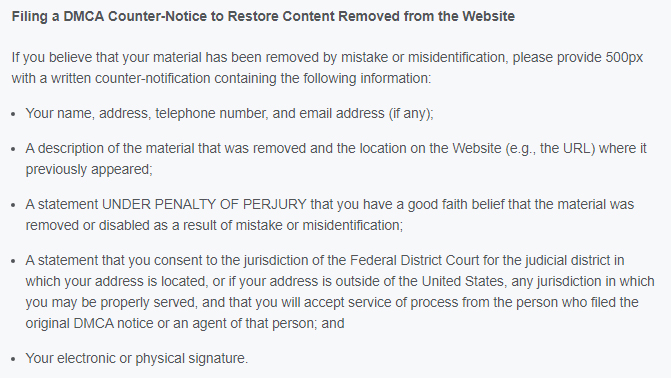
Here's how Tumblr's Terms of Service informs users how to submit a DMCA counter-notification. Note that the structure is the same for submitting a counter-notification as it is for submitting a notification - a list of what information is needed, and who to send it all to:
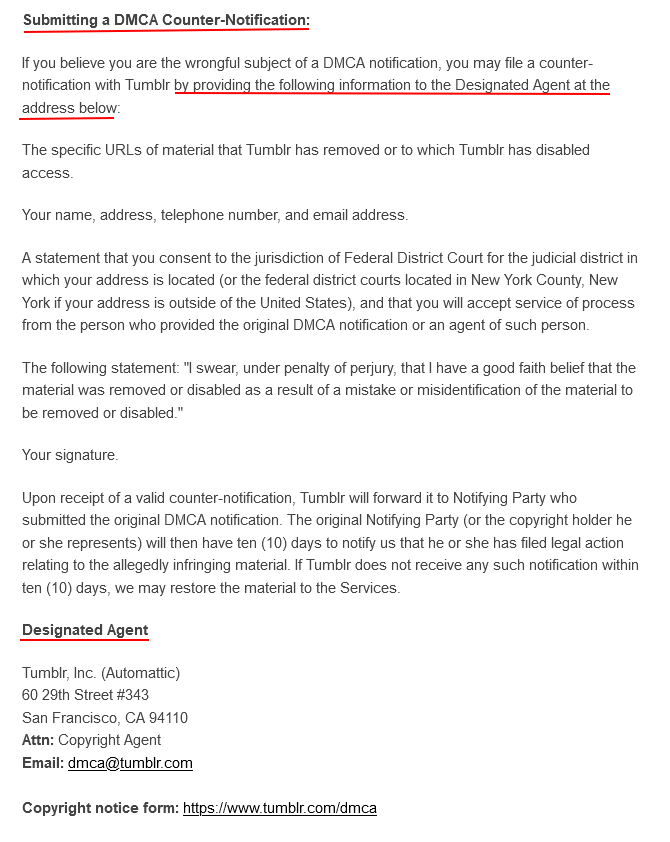
Repeat Infringement Policy
While some DMCA Policies don't include this section, it's a good idea to include it in case you start seeing users that get large numbers of DMCA Notices.
These repeat offenders can potentially cost you a lot of time in managing the DMCA Notices directed at them, so this section of your policy can help discourage that kind of behavior. It also lays out clear guidelines for what to do in that kind of situation.
There are a number of different approaches to this section. You can keep it short, leaving details up to you to decide as you deal with cases of repeat offenders. That's what the National Academies of Science, Engineering, and Medicine (NASEM) does in its Digital Millennium Copyright Act Policy, as seen below:

However, you should notice that they do still specify a potential punishment for violations, criteria for that punishment ("appropriate circumstances"), and that the punishment will be at the institution's discretion.
In what may appear to be a much more detailed approach, InfoTech includes much more information about what repeat infringers can expect. Similar to NASEM, InfoTech specifies that it may cut off service to repeat infringers. InfoTech keeps similar criteria for determining who qualifies as a repeat offender, leaving it up to its own determination. However, it also includes a guideline for who it might consider a repeat offender, which is a little more specific than what NASEM offered:
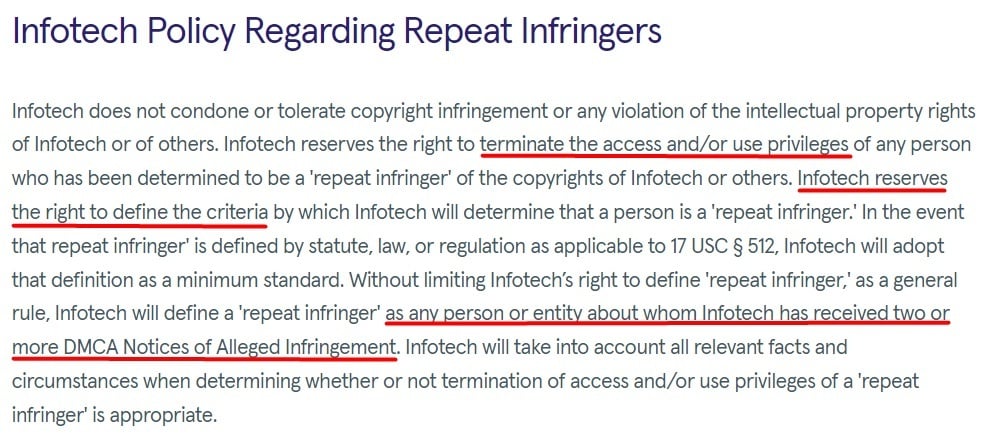
It's worth noticing that in the above analysis, the actual content of NASEM's and InfoTech's policies did not differ significantly. InfoTech offers one point of greater specificity but otherwise seems to treat repeat infringers in an identical way, despite having a policy that appears to be much more detailed.
While detail is often good in these kinds of policies, it may not always be necessary in this case.
Where Should You Publish Your DMCA Policy?

There are two key places from which you should make sure your users can access your DMCA Policy.
First, it should have its own page and be accessible in the same way your Privacy Policy is. But you should also refer to it in your Terms and Conditions and then link to the complete policy from there.
This increases the likelihood that people will come across your policy when they need it and head off any potential complaints.
Here's a good example of how you can include your DMCA Policy in a menu along with other similar documents and disclaimers. Although this is one format that works, there are plenty of other options that can fit with your site's specific user interface:

Summary
DMCA Policies and Notices are very important parts of the legal infrastructure that lets companies publish digital, copyrighted materials. They are the tools that copyright holders use to make sure they have control over how their works are published and distributed.
A complete DMCA Policy should have four parts:
- An introduction and general explanation of the DMCA Notice process
- Instructions for submitting a DMCA Notice to your website
- Instructions for submitting a DMCA Counter Notice for users of your website
- A policy for repeat infringers
Make sure to display your DMCA Policy in a way where it can be easily located, such as via a link next to other important legal agreement links, or cross-linked within a Terms and Conditions agreement in a relevant clause or section.

Comprehensive compliance starts with a Privacy Policy.
Comply with the law with our agreements, policies, and consent banners. Everything is included.
